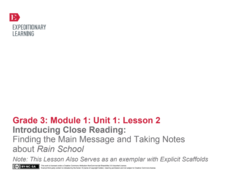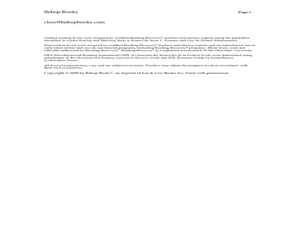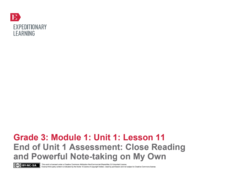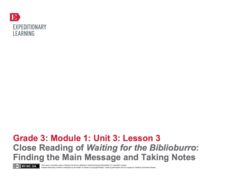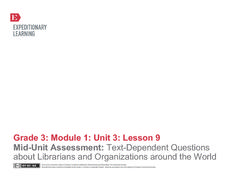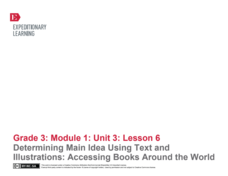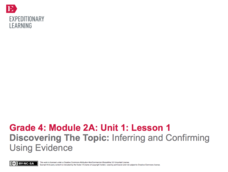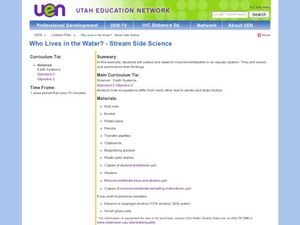EngageNY
Introducing Close Reading: Finding the Main Message and Taking Notes About Rain School
This second lesson in a larger unit is perfect for the beginning of the year because it explicitly teaches 3rd graders how to use close reading skills by identifying unfamiliar words, figuring out the gist, and defining important...
Curated OER
The Best Main Idea
What is the main idea? Interest your young readers with this fun introductory lesson! After selecting several items from a paper bag, the teacher leads learners to determine the big idea for those items. This concept is then applied to...
Curated OER
What Do You See at the Pond?
With What Do You See at the Pond?, young readers explore pond life and practice reading strategies. Learners first make predictions and then read the simple story independently. After a second read-through with a partner, kids come...
Curated OER
Borrowing Narrative Skills from Mr. Fletcher: Using a "Prompts in Reverse" Technique to Inspire Your Writers
Help your class find their writing voices with this lesson which uses the work of Ralph Fletcher to guide a "Prompt in Reverse" activity. Using the chapter "First Pen" from Fletcher's Marshfield Dreams, learners decipher what they...
EngageNY
Close Reading of That Book Woman: How Did People Access Books in Rural Areas of the United States?
For this ninth lesson plan in a larger beginning-of-the-year unit, close reading skills are used independently to find the gist of the story That Book Woman. Rereading for important details is the targeted skill to unlock a deeper...
Curated OER
Guided Reading: Three Little Pigs (Plus Wolf: Javalinas)
Guide your class through reading various versions of The Three Little Pigs. Talk about the traditional story line and then discuss a different point of view: Maybe the wolf was just an innocent bystander! This lesson plan, which has...
C3 Teachers
2020 Protests: Is There Anything New about the 2020 Protests?
Are marches and protests an effective form of resistance? That is the question high schoolers seek to answer in this inquiry lesson as they compare the 2020 protests to historical ones. Researchers use Venn Diagrams to compare images...
EngageNY
Taking Notes Using a Graphic Organizer: Inferring About the Importance of Religion in Colonial America
Improve class understanding of colonial times by reading an informational text and filling out the accompanying graphic organizer. Class members work with a partner to read, take notes, make inferences, and synthesize information.The...
EngageNY
End of Unit 1 Assessment: Close Reading and Powerful Note-Taking on My Own
As the final lesson plan in a larger beginning-of-the-year unit to establish routines and teach close reading skills, this plan is designed as an assessment piece. Using the story, The Librarian of Basra, learners independently...
EngageNY
Close Reading of Waiting for the Biblioburro: Finding the Main Message and Taking Notes
Expose your class to Waiting for the Biblioburro, narrative nonfiction that will act as the bridge between ficiton and informational texts to come. Class members do a close reading of the text, looking at excerpts instead of the whole...
EngageNY
Mid-Unit Assessment: Answering Text-Dependent Questions About Librarians and Organizations Around the World
This is a skills-based assessment that asks test takers to use textual evidence to determine the main idea of an excerpt from an informational text as well as respond to text-dependent questions. The assessment is the middle point...
EngageNY
Determining Main Idea Using Text and Illustrations: Accessing Books Around the World
Ease into informational text with the lesson suggested here. Part of a unit series, the lesson draws from previous lessons and acts as a natural moment to add in informational text. Class members read one section of My Librarian is a...
Curated OER
Persuasive Practice: A Mt. Rushmore Addition
Budding authors research a US President and persuade the National Park Service to add him to Mt. Rushmore. In addition to the persuasive essay, individuals are required to develop a visual presentation using a web-based software that...
Physics Classroom
From a Feather to an Elephant
It is always a rush to drop objects from great heights, and with this physics experiment, class members will not be disappointed! They drop a single coffee filter from a balcony or table top, record the time it takes to reach the ground,...
Baylor College
Tools of Magnification
Life science learners need to be able to use a microscope. With this comprehensive resource, they first experience how lenses and magnification work, and then get familiar with using a compound microscope. Tremendous background...
Curated OER
Retelling Information
This scripted lesson suggests using the journalist’s five W’s (who, what, when, where, why) to teach readers how to summarize a story and to how to distinguish between significant and supporting details. A template and rubric are...
EngageNY
Discovering the Topic: Inferring and Confirming Using Evidence
Allow your class to figure out what they will be studying through an inquiry-based anticipatory set that involves analysis of mystery documents and practice with making inferences. The lesson plan document includes a detailed description...
Institute of Electrical and Electronics Engineers
Rotational Equilibrium
Physics stars design mobiles that demonstrate rotational equilibrium. They take measurements and solve related equations for force by graphing, substitution, or determinants. This is a well-developed lesson plan, complete with student...
BioEd Online
Bone Structure: Hollow vs. Solid
What is meant by the phrase "form follows function?" Allow your budding biologists to discover first-hand through two activities. In the first, groups work together to discover whether a solid cylinder or an empty cylinder can support...
Purdue University
Animal Diversity and Tracking
What exactly are those glowing eyes in the night? Learners run an experiment to attract local wildlife and then document the number of visitors by identifying their tracks. They then analyze the data to draw conclusions about the types...
Las Cumbres Observatory
Measuring the Age of the Universe
Just when is the universe's birthdate? Pupils use previously collected spectra data to find the redshift and radial velocity of supernovas. They then calculate the distance before finally creating a Hubble diagram. Finally, individuals...
Curated OER
Who Lives in the Water? Stream Side Science
Andree Walker thought of everything when he wrote this resource. It includes a detailed list of materials and background information links for the teacher. In addition, it has procedures, a macroinvertebrate identification key, and tally...
University of California
Roots of the Cold War
When and how did the Cold War begin? To answer this question, you will not find a better-organized, in-depth, activity- and inquiry-based resource than this! Executing best teaching practices throughout, each portion of this inquiry...
American Association for the Advancement of Science
Sensing the Invisible: The Herschel Experiment
Learners of light will construct a contraption in which light is passed through a prism and shone into a box. The temperatures at different points along the path and outside of the path of light. The intent is to imitate William...
